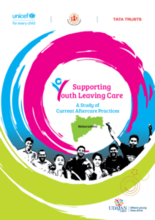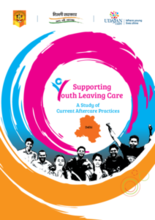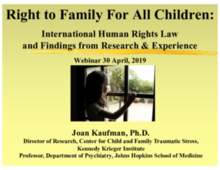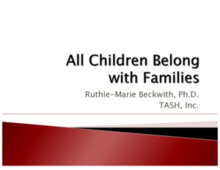Displaying 471 - 480 of 1510
“Current Aftercare Practices” (CAP) is a research study designed to look at the support and services received by Care Leavers (CLs) from the objective lens of an ‘Aftercare Quality Index’(AQI), calculated using the scores within 8 domains. This report covers a total of 107 CLs from Maharashtra, comprising of 74 males and 33 females, from both Government and Non-Governmental Organisation (NGO) run Child Care Institutions (CCIs).
“Current Aftercare Practices” (CAP) is a research study designed to look at the support and services received by Care Leavers (CLs) from the objective lens of an ‘Aftercare Quality Index’(AQI), calculated by using the scores within eight domains. This report covers a total of 55 CLs from Delhi, comprising of 30 males and 25 females, from both Government and NGO-run Child Care Institutions (CCIs). It also includes data from 10 stakeholders, which includes experts, practitioners and duty bearers, working in the field of child protection in Delhi.
This presentation, given at Disability Rights International and the European Network on Independent Living's webinar on the right of all children to a family, outlines the Consensus Statement Position on Group Care for Children and Adolescents of the American Orthopsychiatric Association and reviews the research on the detrimental effects of institutionalization on children from the Bucharest Early Intervention Project and other studies.
The objectives of this open access study were to investigate the association between parental visitation and depressive symptoms among institutionalized children in Japan, and to explore whether the established security of attachment interacts with that association.
With efforts underway at the international level to reconcile different approaches to the right of the child to grow up in a family – in the CRPD, CRC and the UN Guidelines – this webinar addressed some of the following questions: how to ensure every child can grow up in a family, is residential care justified in any circumstance, how to ensure that children growing up in group homes and other residential care settings are given an opportunity to access family-based care, and the right to independent living.
This presentation was given at Disability Rights International and the European Network on Independent Living's webinar on the right of all children to a family by Dr. Ruthie-Marie Beckwith.
In this study, working memory (WM) was examined during late childhood/adolescence as an intra-individual factor to mitigate the risk for separation anxiety, which is particularly susceptible to caregiving adversities, such as previous institutionalization (PI).
In this cross-sectional study, the authors assessed the mental health of children held at a US immigration detention center over two months in mid-2018.
This chapter from the book Re-Visioning Public Health Approaches for Protecting Children considers how the outcomes of alternative care and treatment in child protection can be assessed and the potential promise of public health approaches to child maltreatment.
This chapter from the book Re-Visioning Public Health Approaches for Protecting Children critiques historical and contemporary child protection approaches that are viewed as replicating the colonialist practices of child removal and destruction of families/parenting and communities. Using Australia and Canada as examples, it focuses upon three different sources of the disadvantage and distress that Indigenous communities typically experience: the impacts of Colonisation; intergenerational trauma; and the ongoing social, economic, legal and political inequalities that stem from deep-seated inequity.




